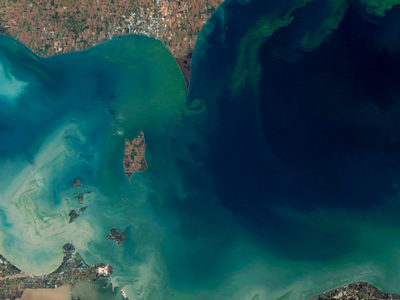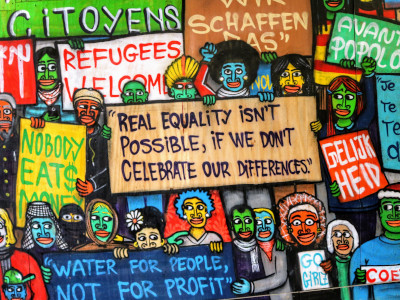This section presents all past projects related to Ca' Foscari's Global Challenges. To discover the on-going projects, please visit the page Projects.
MEDREGION - Marine strategy framework
MEDREGION - Support Mediterranean member states towards implementation of the marine strategy framework directive new GES decision and programmes of measures and contribute to regional/subregional cooperation
The project aims to provide the necessary support to the CIS for the coordinated implementation of the New GES Decision and to provide a useful platform for the necessary Regional and Sub-regional cooperation, in order to support the further development of the Programmes of Measures. It is precisely under this strategic perspective that the involvement of the UNEP/MAP system (UNEP/MAP member of the Advisory Board, INFO/RAC, RAC/SPA, PLAN BLUE partners) plays an essential role, taking into account the regional and cross-border aspects that involve both the EU context and the third Countries.
Website
Researcher: Antonio Marcomini
Duration: 01/02/2019 - 31/01/2021
NETCHER: Stopping illicit trade and protection of endangered cultural heritage
The last decades have witnessed a variety of initiatives promoted by a diverse set of actors engaged in the protection of endangered cultural heritage and in stopping illicit trade, initiatives that have tried to bring solutions, remediation, methods and approaches to tackle looting and trafficking. NETCHER (NETwork and digital platform for Cultural Heritage Enhancing and Rebuilding) seeks to address the complex challenge of harmonising and bringing together these worthy, but often disconnected initiatives by using a participative approach that will result in the establishment of a structured network (defined as a Social Platform) drawing together a broad range of players such as international bodies, umbrella organizations, national governments, researchers, public policy makers, NGOs, as well as public and private foundations. The Platform will take charge of the systematizing and framing of all the emerging best practices in order to enhance and capitalize on the experiences of the partnership members at an international level for building a joint action plan with shared toolkits and a research and innovation roadmap.
Project website / EU Cordis database
Researchers: Cristina Tonghini, Arianna Traviglia
Duration: 01/01/2019 - 31/12/2020
Fundinig: Horizon 2020 Societal Challenges: Europe In A Changing World
SSHOC - Social Sciences & Humanities Open Cloud
Social Sciences & Humanities Open Cloud (SSHOC) is a project funded by the EU framework programme Horizon 2020 and unites 20 partner organisations and their 27 associates in developing the social sciences and humanities area of the European Open Science Cloud (EOSC). During the 40-month lifespan of the project, SSHOC will transform the current social sciences & humanities data landscape with its disciplinary silos and separate facilities into an integrated, cloud-based network of interconnected data infrastructures.
Project website / EU Cordis database
Researcher: Agar Brugiavini
Duration: 01/01/2019 - 30/04/2022
Funding: Horizon 2020
SASPAS - Safe Anchoring and Seagrass Protection in the Adriatic Sea
The overall objective of the project is to improve seagrass preservation and restoration through laying safe anchorage innovative systems, performing pilot transplantations, carrying out monitoring activities and by defining an integrated management system for seagrasses in Adriatic area. The project will spend 30 months on three research sites: Panzano Bay, Monfalcone (IT), National Park Kornati (CRO) and Brindisi Coast in the Dune Costiere Natural Park of Torre Canne to Torre San Leonardo (IT). The SASPAS project is financed by the European Foundation for Regional Development under the Interreg V-A Program IT-CRO CBC (Priority Axis 3- Environment and Cultural Heritage). The lead partner is the Municipality of Monfalcone, and the project also includes seven (7) partners from Italy and Croatia. CoNISMa applied with the Local Research Unit of Trieste.
Website
Researcher: Adriano Sfriso
Duration: 01/01/2019 - 31/03/2022
SIforREF – Social policies for refugees integration
The challenge that SIforREF addresses is combating the risk of marginalization of refugees after the reception phases, which are different in each country, through the design and implementation of social innovation methodologies. The project aims to facilitate refugees’ autonomy by enhancing or launching refugee integration policies at regional and local level (countries involved: Italy, Germany, Austria and Slovenia). To achieve this objective, refugee integration should be included in the decisional agenda both at local and transnational level and policy-makers should adopt inclusive measures in governance. The complexity of this issue requires a mutual learning among central European regions, especially neighbourhood regions like those involved in the project.
Website
Researcher: Francesca Campomori
Duration: 01/01/2019 - 31/12/2021
ECOS4IN ‐ Cross‐border Ecosystem for Industry 4.0
The 4th industrial revolution is inevitable and will affect all industrial sectors. The impacts of Industry 4.0 depend on readiness of regions to respond, accept and adopt the changes. Our model supports the sustainable cooperation of actors of innovation systems to strengthen and prepare the regional innovation capacities in CE area for such changes. ECOS4IN project connected the partners from CE countries that have specific idea about expected impacts of Industry 4.0 implementation and wants to involve the entities from other regions dealing with similar problems. There is a strong common intention of partners to find new creative ways how to use the opportunities of Industry 4.0 and other technologies called "advanced manufacturing systems" while eliminating the risks. The project has contributed to improving regional innovation capacity by creating a suitable environment for the implementation of Industry 4.0.
Website
Researcher: Vladi Finotto
Duration: 01/01/2019 - 31/12/2021
Con 3 Post: Mapping the Trend in the Construction Sector
Con3Post ("Posting of Third Country Nationals: Mapping the Trend in the Construction Sector") explores a persistent and under-researched trend of recruiting and posting of third-country nationals to work in the construction sector within the single European labour market. It seeks to produce new knowledge on the phenomenon, encourage transnational cooperation and exchange of information between key stakeholders in the EU and third countries, and increase access to information.
Website
Researcher: Fabio Perocco
Duration: 01/01/2019 - 31/12/2020
AI4EU - A European AI On Demand Platform and Ecosystem
Artificial Intelligence is a disruptive technology of our times with expected impacts rivalling those of electricity or printing. Resources for innovation are currently dominated by giant tech companies in North America and China. To ensure European independence and leadership, we must invest wisely by bundling, connecting and opening our AI resources. The AI4EU project will efficiently build a comprehensive European AI-on-demand platform to lower barriers to innovation, to boost technology transfer and catalyse the growth of start-ups and SMEs in all sectors through Open calls and other actions. The platform will act as a broker, developer and one-stop shop providing and showcasing services, expertise, algorithms, software frameworks, development tools, components, modules, data, computing resources, prototyping functions and access to funding. Training will enable different user communities (engineers, civic leaders, etc.) to obtain skills and certifications.
It will mobilize the whole European AI ecosystem and already unites 80 partners in 21 countries including researchers, innovators and related talents. Eight industry-driven AI pilots will demonstrate the value of the platform as an innovation tool. In order to enhance the platform, research on five key interconnected AI scientific areas will be carried out using platform technologies and results will be implemented. The AI4EU Ethical Observatory will be established to ensure the respect of human centred AI values and European regulations. Sustainability will be ensured via the creation of the AI4EU Foundation.
Project website / EU Cordis database
Researcher: Marcello Pelillo
Duration: 01/01/2019 - 31/12/2021
Funding: Horizon 2020 Industrial Leadership: Leadership in enabling and industrial technologies - Information and Communication Technologies (ICT)
QUEST - QUality and Effectiveness in Science and Technology communication
Science Communication (SciCom) plays a key role in addressing today’s societal challenges. To be effective, it must be conceived as multi-directional communication, involving scientists, policy-makers, journalists, other communications actors and citizens. On one side, scientists produce research results but are not always equipped to communicate efficiently to the public and to policy-makers. On the other, journalists and other communications actors act as the interface between science, citizens and other audiences, although they may face challenges in fully comprehending the scientific message. Citizens will have a varied perception of the information received but limited knowledge and tools impeding a qualitative assessment. The variety of means of communication existing today makes communications faster and easier, but that increases the complexity of these interactions and the challenge to communicate “sound” science. We also need to consider that much of today SciCom passes through the digital sphere, as the advent of digitalization has changed the way in which information flows and opinions are shaped, also regarding science. Social media are one of the key representatives of these modern means of communication, deserving a special focus.
QUEST aims at facing this challenge with a multi-step approach that will: (1) understand the dynamics of today SciCom (2) design tools to evaluate SciCom quality (3) experiment best practices and proposing innovative ways for SciCom (4) promote SciCom training (5) build an engaging SciCom community. The focus will be on (a) journalism (b) Social media (c) Museums, recognized as having the highest impact in this context. Climate change, vaccines and Artificial Intelligence are used as case studies.
Project website / EU Cordis database
Researchers: Fabiana Zollo, Enrico Costa
Duration: 01/01/2019 - 31/01/2021
Funding: Horizon 2020









